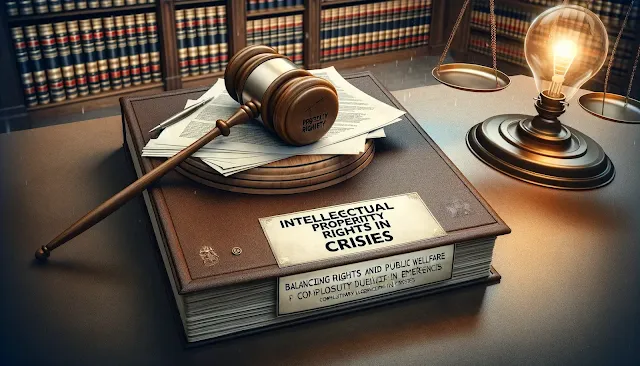- Get link
- X
- Other Apps
- Get link
- X
- Other Apps
Statutory Limitation like Compulsory Licensing of Patents during Crises
In the realm of intellectual property (IP), the delicate balance between innovation ownership and public welfare often comes to the forefront during critical conditions. This article delves deep into the intricacies of IP protections within the context of restricted legal constraints, particularly focusing on the concept of mandatory licensing of patents in emergency situations.
Background of IP Protections
Intellectual Property and Innovation Ownership
The foundation of IP protections lies in recognizing and safeguarding the rights of creators and innovators. This legal concept ensures that individuals and organizations have exclusive control over their knowledge assets rights. In the sphere of patents, this translates to patent protections, which grant inventors exclusive rights to their inventions for a specified period.
Emergence of Restricted Legal Boundaries
However, in specific legislative restrictions, these exclusive rights can be subjected to certain modifications. This is where the concept of a narrow statutory limitation comes into play, particularly in dire scenarios. These modifications are designed to balance the private rights of patent holders with the larger public interest.
( Also read our In-Depth guide on IP Laws for Fashion Industry )
Compulsory Licensing in Crises
The Concept of Mandatory Licensing
Compulsory licensing, or government-mandated licensing, is a mechanism that comes into effect under constrained statute provisions. It allows a government to permit the use or production of a patented invention without the consent of the patent holder, primarily in critical conditions such as public health emergencies or national security threats.
Case Studies: Involuntary Patent Permissions During Pandemics
Historically, there have been instances where obligatory license grants have been utilized during health crises. These case studies illustrate how emergency IP management becomes crucial in ensuring that essential medical treatments and technologies are accessible to the public in times of need.
Legal and Ethical Considerations
Balancing Patent Rights and Public Interest
The use of involuntary patent permissions during crisis events raises significant legal and ethical questions. It involves weighing the intellectual property grants against the urgent needs of society. This balance is crucial in maintaining the integrity of the patent system while addressing immediate public health or safety concerns.
Global Perspectives and Legal Adaptation in Pandemics
Different countries have approached the idea of mandatory licensing during emergencies in varied ways. The global perspectives on this issue reflect diverse legal systems and cultural values, highlighting the complexity of implementing such measures universally.
Conclusion
In conclusion, the topic of IP protections in the context of narrow statutory limitation like compulsory licensing during crises is a multifaceted one. It requires a nuanced understanding of patent law interpretation, crisis response legal framework, and the balance between individual rights and collective welfare. As the world navigates through unprecedented challenges, the evolution of these legal frameworks will be critical in shaping the future of intellectual property rights in emergency situations.
Frequently Asked Questions
What are Intellectual Property Rights in the Context of a Crisis?
Intellectual Property Rights (IPR) refer to the legal protections granted to creators and innovators for their inventions and creations. In a crisis, such as a public health emergency, these rights become crucial as they can impact access to essential technologies or treatments. However, these rights may be modified under certain emergency legal frameworks to ensure public welfare.
How Does Compulsory Licensing Work During Emergencies?
Compulsory licensing is a legal mechanism that allows a government to authorize the use or production of a patented invention without the consent of the patent holder. This is typically done in emergency situations, like a health crisis, where access to a patented technology or drug is essential for public health. The government usually compensates the patent holder, but the primary goal is to ensure public access to critical innovations.
What Justifies the Use of Compulsory Licensing in Crises?
The use of compulsory licensing in crises is justified by the need to balance the private rights of patent holders with the public interest. In emergency situations, such as a pandemic, the immediate availability of necessary medical treatments or technologies can be vital for saving lives and addressing public health needs.
Are There International Laws Governing Compulsory Licensing During Crises?
Yes, international laws such as the Agreement on Trade-Related Aspects of Intellectual Property Rights (TRIPS) include provisions for compulsory licensing. The TRIPS Agreement, administered by the World Trade Organization, allows member countries to issue compulsory licenses under specific conditions, including national emergencies or other circumstances of extreme urgency.
How Does Compulsory Licensing Affect Innovation and Patent Rights?
Compulsory licensing in a crisis can raise concerns about its impact on innovation and patent rights. While it ensures that critical needs are met during emergencies, there is an ongoing debate about its long-term effects on innovation. Critics argue that it may discourage future investments in research and development, while proponents believe it is a necessary measure for public welfare in extraordinary circumstances.
Crisis IP Solutions
Emergency Licensing 101
IP Rights in Crisis - Act!
Must-Know IP Changes
Urgent Patent Laws!
- Get link
- X
- Other Apps


Comments
Post a Comment